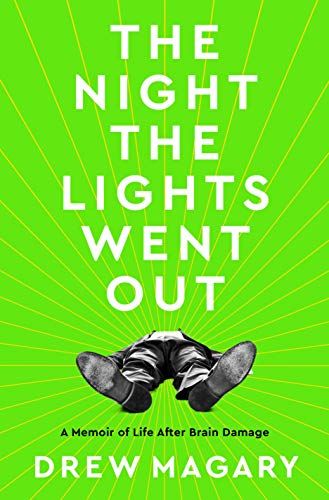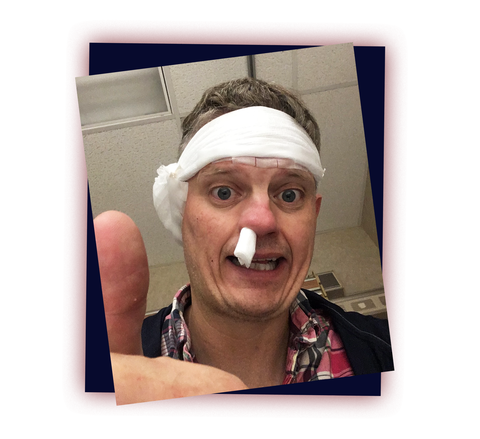An Accident Nearly Killed Me. Then Therapy Saved My Life.

“I HATE THE WORLD! I HATE THE FUCKING WORLD!”
That was me. Alone. In a shopping mall parking lot. I was running a quick errand and short on time. If you’ve ever been to a shopping mall in the DC burbs, you know that there’s never any parking anywhere, and that everyone else driving through the garage sucks. I couldn’t find what I was looking for at the mall and then, after sulking back to my car, I got hemmed in by three other cars converging on an open space, leaving no room to get out of each other’s way. After waiting—not all that patiently—for the deadlock to clear, I tried to leave the garage, only to encounter one of those surprise dead ends that parking-garage architects put in to keep themselves interested.

I blew up. And I liked it. Anger was a treat I got to indulge in. Anger is seductive that way. I enjoyed being angry. Regret came only after the fact. In the moment, there was a little voice in my head feeding me approval, letting me know just how right I was to be pissed.
But this time, raging out in my car, another voice commandeered my mind. What are you doing, Drew? What the fuck are you DOING? I heard myself. I was mortified. Repulsed. After everything my wife Sonia and my family and my friends had done for me—all the crying and all the sleepless nights and all the paperwork and all the begging for me to get up and leave that fucking hospital and live—this was their reward?
All this time, I had balked at therapy. A year prior, I had suffered a massive brain hemorrhage that left me comatose for two weeks and half-deaf for life. I had permanent damage in my frontal cortex, which helps regulate mood. I knew the damage was there. I knew what it meant. And yet, despite having a prescription for therapy in my pocket, I still hadn’t gone. Insurance wouldn’t cover it, and I didn’t wanna pay full freight. The one thing I clearly needed most, and I was too cheap to get it. I had never gone to a therapist before in my life. This was because I always assumed I didn’t need it, which was arrogant. I talked a big game about supporting people who spoke openly about their mental-health issues: people who weren’t afraid to ask for help. But when it came to myself, I might as well have been stuck in 1950. I figured I was all good.

But I wasn’t all good. I was a sour man eager to pick a fight. I stared daggers at my son Colin when he came to me with tech problems. I got angry at speed bumps. When my daughter Flora was rude to me once, I reminded her, “Hey, you know I almost died,” like it was a fair card to play. I yelled at our dog Carter when he barked too loudly at me. One time I gave his leash a vicious yank when he wouldn’t walk any farther around the block. Cruel people do this. I was fighting and fighting and fighting, all just to fight, and I was wearing down everyone around me because of it.
“I’m gonna see a therapist,” I told Sonia.
“I think that’s a good idea.” No need to talk this one out. The second I said I was gonna do it, it was clear to us both that the decision had been long overdue.
I googled around for therapists. I didn’t worry about insurance. I didn’t ask for referrals. I didn’t look for therapists with an MD because I had already tried to pill my way out of this, to no avail. I didn’t even restrict myself to therapists who dealt specifically with TBI patients. I just wanted straight-up, real-deal therapy. I found a local practice and checked the treatment bullet points on their website: Anxiety, Depression, Self-Esteem, Anger Management, Career Changes, Grief and Loss, Relationship Enhancement, and Parenting. Sold.
I called the practice and they paired me up with Gabriela Barber, an MS who had an extensive background in treating couples, middle-school kids, and women suffering from postpartum depression. As an individual patient, I didn’t fit into any of those categories. It didn’t matter. I scheduled the first available appointment.
Gaby asked me why I needed therapy. I told her that I had anger issues stemming from a TBI. She explained to me that anger has five root causes:
1. A need for revenge
2. Feeling helpless
3. Feeling discouraged
4. A need to prove your importance
5. Feeling overwhelmed
Number four. That was me. Every time I got angry at Sonia and the kids, I felt unappreciated and disrespected. Excuse me, but do I not help out around here? Do I not cook and clean and spend time with the kids and do all of that tedious bullshit without needing to be nagged to do it? You people are lucky I do all that shit. Not every dad does.
Except I wasn’t important. I was an asshole.
Gaby marked me down as having adjustment disorder. It was a throwaway diagnosis, used strictly for the sake of bureaucracy. But the phrase stuck in my blotted mind, and a more objective picture of myself emerged. Putting a name to your condition is often its own form of treating it. In my case, I had an affliction from my hemorrhage that roped together every other affliction the accident had produced, a condition that I had refused to notice and hadn’t bothered to solve.
Not anymore. I got to work. Same as I did in that rehab ward. To keep my mind domesticated, I started an Anger Tally in the notes app on my phone, keeping a record of anytime I lost my shit. For example, one night a smoke alarm went off in the house. I also included the time I got unreasonably huffy with a CVS clerk, and the time I smacked a wall and hurt my hand because I was in a bus bathroom and the bus wouldn’t stop shaking long enough for me to hit the bowl with my piss. They all went into the tally. My own permanent record.

I kept going to sessions with Gaby and grew calmer. More tolerant. More self-aware, in a way that was useful and not just for show. I would not obsess over things that made me feel angry. If I got angry, I would take a twenty-minute “constructive timeout” and distract myself (usually by playing golf on the kids’ PS4) so that I wouldn’t ruminate on why I was angry about something. In fact, I had to avoid lingering on those issues in any way, positive or negative.
Most important, I was learning to get over my own thoughts. After all, I had nearly lost the ability to think at all. I had to let go of that possessiveness. I took a clinical look at my thoughts and feelings and then asked myself if those thoughts were helping a situation or not. If they weren’t helping, well then I needed to shut the fuck up or seek out helpful thoughts from other people. If I couldn’t solve the problem after all of that, I had to understand that putting pressure on myself, or on other people, to fix it right away wasn’t gonna amount to anything. Some problems—a permanently disabled olfactory system, for instance—have no solution. Your salvation lies in accepting that and adjusting your life accordingly. It does not come from sitting in permanent dread.
From the book THE NIGHT THE LIGHTS WENT OUT: A Memoir of Life After Brain Damage by Drew Magary. Copyright © 2021 by Drew Magary. Published by Harmony Books, an imprint of Random House, a division of Penguin Random House LLC. All rights reserved.
Source: Read Full Article